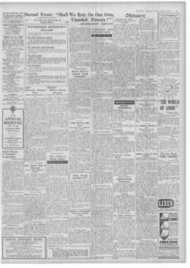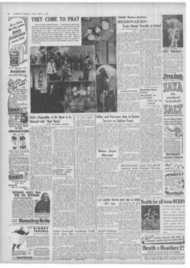Page 3, 14th April 1944
Page 3

Report an error
Noticed an error on this page?If you've noticed an error in this article please click here to report it.
Tags
Share
Related articles
Maisie Ward: G.k.c. Biography Ready Soon
Turk And Turkey
System In Chaos Chesterton's Sanity
Gkc Warmonger, Pacifist, Tory . .
The Holy Jester
G. K. C.
Gilbert Keith Chesterton. By Maisie Ward. (Shecd and Ward, 21s.)
Reviened by MICHAEL DE LA BEDOYERE (ICCASIONALLY a reviewer
feels tip against a task he would gladly shirk. A life-long admirer of Chesterton and in the great writer's last years one of the thousands whom he personally befriended, an admirer, too, of his biographer whose Iwo hooks of men and matters concerning her father and grandfather I have rcad with enjoyment and immense profit, I took up the long-awaited life se Chesterton with all the excitement of a child receiving the toy for which he has longed, and I foresaw the glowing and appreciative notice that I would soon be writing. Alas, whether I am suffering from having to wait too long or whether the war is getting mc down, I find myself unable to drive away the rather critical and disappointed thoughts to which the reading of the book has given rise. At any rate, I can console myself with the certainty that nothing I nor anyone else may write, in praise or dispraise, will remotely affect the eagerness of every person of sense to get hold of the book as soon as possible and to put away every care in order to read its every page. And I hope that the vast majority will come to different conelusions from myself A Fascinating Account The five hundred odd pages are, needless to say, fascinating. They arc about Chesterton — about his youth, about his family, about that early company of literary knights who formed the Junior Debating Club, about his engagement and marriage, about his early art, his early journalism and his early hooks, about his politics and the fights he waged against the powers that were, even in his own party, about the gallant company that produced the independent papers which struggled so bravely for truth and honesty in Chesterton's beloved country and struggle still, about the Chesterbelloc, about the greater and matures books and the Poetry, about his fiiends and his brother. for whom he sacrificed so much because he loved him so much, about the Marconi scandal (a model chapter written by Frank Sheed), about the illness, about the conversion, about Father Brown, about the greatest of all the books, about the travels—arsd through it all the tracing of the development of the rich, intuitive, poetical mind seeing and, indeed, illuminating the way to Rome, and, having found Rome, resting in its majesty and giant sweep so that the truths once grasped in a private vision could be stated and transmitted with the firmness and the depth and the colour of one who knows and is uplifted by the strength of a Faith that is at once a discovery and a habit. Nor in this long account, the fruit of six years of patient and painstaking research, is there any attempt to disguise the weaknesses of a genius.
Indeed, as a conducted tour to
Chesterton, written in the easy and pets sonal style that so well suited Mrs. Sheed's earlier works, this book is admirable and, of course, indispensable to Chesterton's biographer. And there's the rub: it doesn't seem to nie a biography. I readily grant the difficulty of writing a biography of a man like Chesterton. Apart from a comparatively few simple facts, in themselves not so very dissimilar from the lives of many others, apart from anecdote and oddities of manner and personality. Chesterton was the mind and soul and personal radiance of Chesterton, as expressed in his books, articles, letters. conversation. And even then one hasn't merely to deal with half-a-dozen great works, but with a lifetime's unceasing flow of !emery activity of all kinds, every bit of which was spontaneous in the sense that it was the immediately stimulated reaction el a rich and original imagination feeding on an immense accumulation of impressions and ideas in constant process of intellectual digestion—if so offensive a phrasi's may be allowed for what was really a poet's power of evoking fresh perception of reality even in the course of the rational process of arguing. With a man like Chesterton, feel, the biographer cannot he content with journeying from A to Z either in following the development of his mind or in following the sequence of events which made his outward life. And I think, too, that with Chesterton the biographer's contribution should be confined to the heavy enough task of seeking the pattern or form within which Chestetton will be presented as a whole and that otherwise his personal views and comments should be reduced to a minimum.
I cannot think that a sentence like the following is in place: "To return to ?sly own notes. It is horribly characteristic that I wrote them in 4711 undated notebook. but I think that luncheon which lasted so long must have been in PM." And it is fairly characteiistic of the commentator through the book.
On the other hand, even if we take the view that Chesterton's real biographer will be someone who did not know him well personally and who was not intimately associated with his life and friends, we (and that !inure biographer) owe very much to Mrs. Sheed. Much of what she has told us of Ches. tetton's private and domestic life comes from no books or research, but from her personal knowledge of him, and. thank God. she has dealt well and truly with accusations and insinuations about the relations between Gilbert and Frances that have been published. But all this once more is valuable material for a future work rather than one of the pieces already fitted into the pattern.
Chesterton the Catholic
Another point I would make—and it may seem to come strangely from the
columns of this newspaper and it 'is that the author has paid relatively too much attention to Chesterton, the Roman Catholic. I use Roman Catholic purposely and in the sense which it connotes for most Englishmen. To Cheeterton the Catholic in potentia and ill actu she could net pay too much attention. The magnificent Catholic mind always at work in literary criticism, in history, in politics, in art, in journalism, in poetry, in debate, in sociology, in philosophy, must surely give the key to the pattern to which I have referred. No one in our day— anti perhaps never—has so amply demonstrated the catholicity of the Church. Mrs. Sheed has , done much to make this clear. more parte:ill:lily in the case of the poetry—all the more reason, then (in my view which may be completely wrong), why she might have cut down a little on the more external Catholic life and activities which tills so much of the later pages. Chesterton was a Catholic like the simplest and humblest of Catholics. Anything like a merely intellectual Catholicism would have been abhorrent to his nature and indeed to his genius, and this point should most certainly be made with many an illustiation. But is there need. lot Much mole in a work that can de so much to show one great side of Catholicity, its universality, its rationality, its humanity '1 Of the other side, its mysticism and its sacramentality, its devotion and its asceticism, Chesterton was more indirectly a prophet. How many of us will sympathise with his remark on getting up early to go to Masse : " What but religion would bring us to ,such an evil pass !" Mrs. Sheed admits that he was no ascetic or mystic. in the ordinary sense, but suggests that the intensity and difficulty' of his neverceasing intellectual work was a form of asceticism leading to mysticism. , " Is there not," she asks, " lot the thinker an asceticism of the mind, very search ing, very purifying ?" The question leads one into very difficult country, but it does not seem to mc necessary to deny that Chesterton did not live in those particular mansions which me inhabited by the religious in the narrower sense. Indeed, I like to think that he was one of the too few who can live great Catholic lives in mansions more open to the generality of men. There will be special interest in the letters from Shaw and Wells which are published, and many will be glad to learn of the uniformly genial relations between men so opposed to one another in outlook as G.K.C. and the secularist prophets. That, too, is a lesson to us smaller fry. If then I have started (reluctantly) with criticism and maintained a querulous note, I hope I have also helped to show what a tremendous task Mrs. Sheed so courageously undertook and how the very reading of her great work (for in its order it is a great work) suggests all the time the attempt to do the impossible : to bring Chesterton back to life in pen and ink. But it would be wrong to leave the reader without an example of Chesterton at his best and his biographer rising to her subject: " After he got hork" she writes in reit:twee to his last journey abroad, "/ remember how delightedly Gilbert quoted the captions on two banners
hung in the heart of a London slum.
One read. ' DONIf with Capitalism— God Save the King.' The other read. ' Lousy but Loyal.' He knew that it was true and it served in increase the passionate quality of his pity. Patient he could be for himself, but the lot of the poor amused in him a terrible anger—and in a broadcast on Liberty he gave that anger vent. For worse than the presence of lice in our slums was the absence of liberty. He would gladly.. he said. have spoken as an Englishman, hut he had been asked to speak as a Catholic. and therefore, ' ant going ro point out that Catholicism created English liberty; that the freedom has remained exactly ht so far as the Faith has remained; and where it Is true that all our faith has gone. all our freedom is going. if I do this. I cannot ask most Of you to agree with me; if I did anything else, I eadld not ask any of you to respect me.' " CT'S. new publications for April include Bernadette of Lourdes, by the Rev. C. C. Martindale, S.J., pike 6d. (reissue), and My Ten Children, by Maude E. Lawless, price Id.
Irish Art is a leindbook which brings together the work of architects. sculptors, painters. musicians and writers in a way that each may understand what the other is doing, and that the public may understand what they arc all doing. Over and above the articles on particular artists, there is an excellent essay by Fr. Leen on the relations of ait and philosophy, a collection of representative illustrations and some practical informative advertising. (Parkside Press, Dublin, 3s. 6d.)
blog comments powered by Disqus







